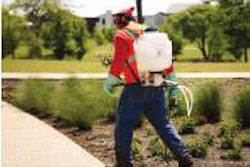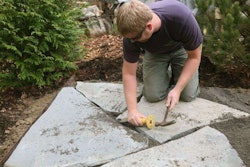Bob’s Outdoor Power Equipment in Vestavia Hills, Alabama, has been selling and servicing all types of landscape equipment for 25 years. Owner, Daryl Carr, estimates 90 percent of the repair problems that come into his shop are gas-related issues.
“On a two-stroke, it’s more of an issue than with a four-stroke engine,” he says. “In the smaller two-strokes, you’ve got flexible diaphragms pumping the fuel. When a diaphragm hardens up with ethanol, it doesn’t do its job.” Ethanol is frequently the suspected culprit.
Mechanic Craig Douglass of Bob’s Power Equipment in Vestavia Hills, Alabama, holds one of the most vulnerable parts to ethanol – small engine carburetor.One of the biggest problems with ethanol is it is hydrophilic – it attracts water. The longer ethanol sits in your tanks, the more moisture it absorbs out of the atmosphere.
Most experts say after two months of sitting idle, the E10 fuel in a chainsaw, trimmer or other small engine will likely be too wet to start.
Here’s how to prevent damage:
1. Use a quality fuel additive designed to combat ethanol.
2. Don’t purchase more gasoline than you can use in two months.
3. Use a test kit to check to be certain the ethanol content is 10 percent or less.
4. Check with marinas about purchasing ethanol-free gasoline.
5. Run engines completely out of gas if you plan to store them for more than two months.
6. If an engine has been idle for more than two months, replace old fuel with fresh before cranking it.
7. Purchase cans of ethanol-free fuel pre-mixed with oil from a small engine servicing dealer.
8. Store fuel and equipment in a dry place.









